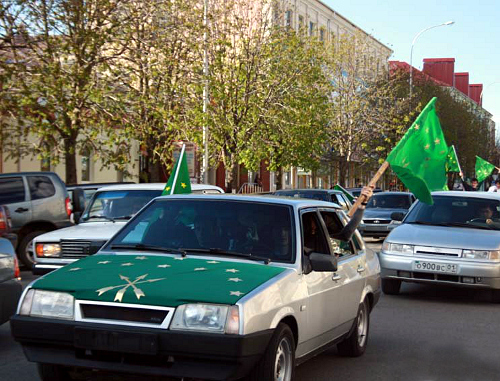
Circassian Expert Says Russia Lost Chance to Capitalize on Syrian Circassians’ Repatriation
Publication: Eurasia Daily Monitor Volume: 9 Issue: 170
By:

On September 14, in Cherkessk, Circassian youth activists from Karachaevo-Cherkessia, Kabardino-Balkaria, Adygea and the Stavropol region adopted an appeal to President Vladimir Putin concerning the situation in Karachaevo-Cherkessia. The activists protested repeated attempts by the Karachaevo-Cherkessian police to seize Circassian flags from them during public celebrations. The incident took place on August 30 and involved Eudard Derev, the son of the Circassian businessman and member of the Russian Council of Federation Vyacheslav Derev. One police officer was injured in the clash with the Circassians. The relatively trivial incident provoked massive response from the Circassian activists who complained of mistreatment at the hands of the Karachaevo-Cherkessian police, who reportedly target manifestations of Circassian nationhood, flags and other symbols displayed during large wedding processions. At the same time, they alleged that Karachay processions go completely undisturbed (https://www.kavkaz-uzel.ru/articles/212655/).
Karachaevo-Cherkessia is no stranger to ethnic tensions. During the 1999 presidential elections in the republic, followers of the Karachay candidate Vladimir Semyonov clashed with followers of the Circassian candidate Stanislav Derev, Vyacheslav’s brother who died in 2006. After Semyonov won the elections, the Circassians announced they would not live with the Karachays in the same republic and sought secession. Moscow dispatched additional armed forces to Karachaevo-Cherkessia and even pressed hard on Semyonov to resign. A mass uprising of ethnic Karachays led to eventual acceptance of the election results by the Circassians and Moscow. The ordeal lasted for several months just before the start of the second Russian-Chechen war and many observers at the time feared that Karachaevo-Cherkessia might follow Chechnya’s lead (https://www.igpi.ru/monitoring/1047645476/1999/0999/9.html).
Karachaevo-Cherkessia is a complex republic. With a population of just under a half million, it is one of the most ethnically diverse republics in the North Caucasus. Ethnic Karachays, who are a Turkic-speaking people, comprise 41 percent of the republican population and occupy commanding positions in the republic. Ethnic Russians make up 31 percent of the population, but are practically impotent in regard to the republic’s internal politics. Ethnic Circassians, on the contrary, comprise only 12 percent of the republican population but are a politically vibrant group. Ethnic Abazins, who speak a language related to both Circassian and Abkhaz, make up eight percent of the population. Ethnic Nogais, who are also Turkic-speaking but very different from the Karachays, make up just over three percent of the republican population (Russian state statistical service, www.gks.ru). Another peculiarity of Karachaevo-Cherkessia is its relative isolation from the rest of the North Caucasus due to the poor road network and mountainous terrain. The republic is also relatively new: prior to 1990, Karachaevo-Cherkessia was part of the neighboring Stavropol region. While Circassians are a minority and the Turkic-speaking Karachays are a majority in Karachaevo-Cherkessia, the situation is the reverse in neighboring Kabardino-Balkaria, where ethnic Kabardins (aka Circassians) are a majority and ethnic Balkars, who are virtually the same people as the Karachays, are a minority.
The potential for conflict in Karachaevo-Cherkessia, however, remains quite high. “We believe that insulting the Circassian national flag and interfering with national traditions by any citizen are unacceptable,” the Circassian activists’ group cautioned Russian and regional officials in their appeal. “It is particularly unacceptable when law enforcement agencies, which in the eyes of the population are representatives of the official authority, insult and interfere in the national life of one of the indigenous peoples of Russia” (https://aheku.org/page-id-3197.html). Previously, Circassian activists called on the three republics in which Circassians make up the so-called titular nationalities—Karachaevo-Cherkessia, Kabardino-Balkaria and Adygea—to share the burden of accepting Syrian Circassian refugees after Kabardino-Balkaria used up its quota given by the Russian government to accept emigrants temporarily. The Karachaevo-Cherkessian government called on Moscow to help the Circassians, but it adopted a more cautious approach to accepting Circassian refugees in its republic.
Meanwhile, a well-known Circassian scholar, Naima Neflyasheva, warned that the Russian government’s inconclusive response to the Syrian crisis might cost the Russian government the loyalty of the Circassians. The Russian government largely ignored the pleas of the Syrian Circassians to return to their historical homeland in the North Caucasus. Multiple appeals by Circassian activists remained unanswered, and the topic has been practically silenced in the Russian press. “Only a year ago, repatriation of the Syrian Circassians, however cynical it might sound, provided the Center [Moscow] with a unique chance to express good will toward compatriots [Circassians in Syria],” Neflyasheva wrote. “This would have led to a significant decline of Circassian political activism in regard to the Olympic Games in Sochi. Today, it appears this theme [the Sochi Olympics] will become the primary catalyst for protest sentiments that will ensure the rise of reputational risks for Russia” (https://carnegie.ru/publications/?fa=49368).
Karachaevo-Cherkessia is one of the westernmost republics of the North Caucasus, so Moscow naturally should be concerned about the situation in the republic in the run-up to the 2014 Olympics in Sochi. Moscow potentially could have used the Karachays as a counterbalance to the Circassians in the republic. However, the limitations of such an approach are obvious, given that pitting Karachays against Circassians would still destabilize the situation in the region. It appears the rise of nationalisms across Russia is gradually increasing in the North Caucasus as well, as republican populations organize along ethnic lines.




